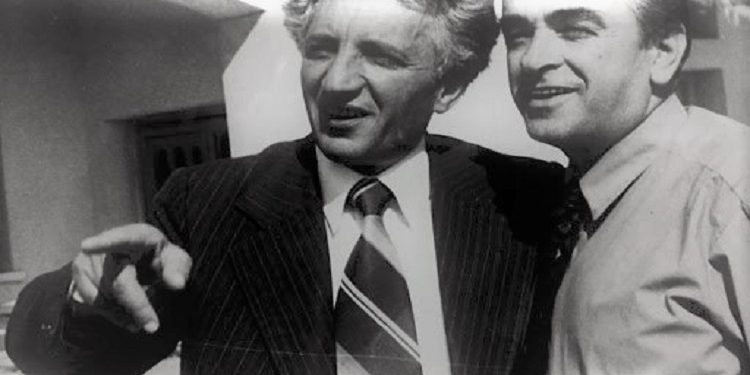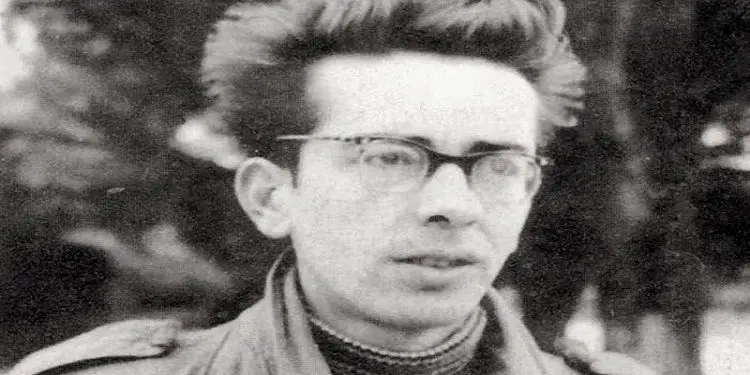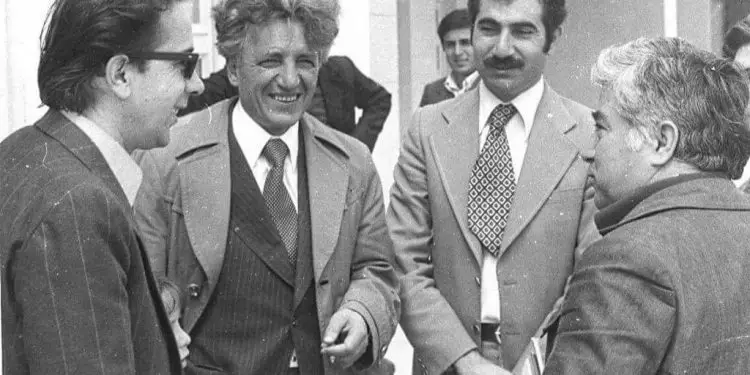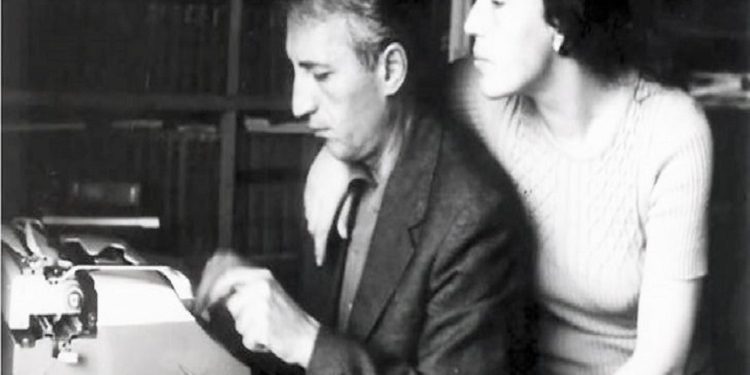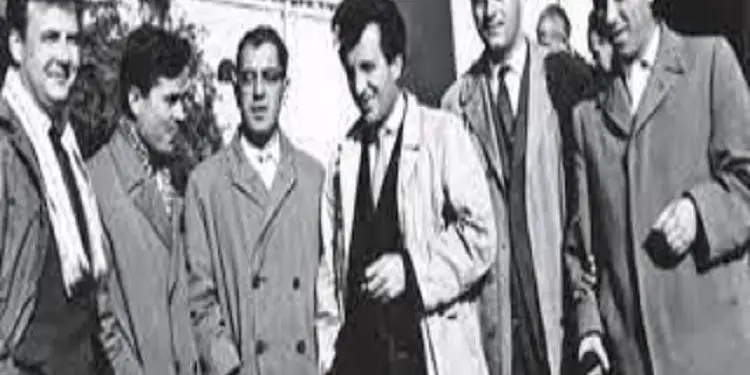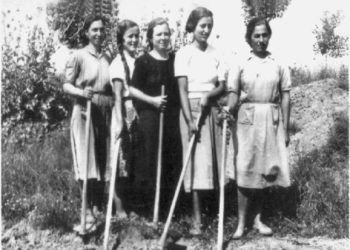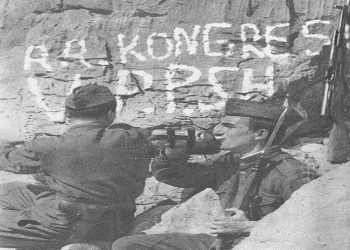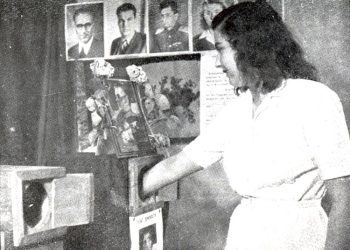By Skifter Këlliçi
The first part
-Piece of events from a historic meeting, with the participation of the dictator-
July 11, 1961, so 61 years ago…!
Memorie.al/ Enver Hoxha, although it was not announced that he would participate, suddenly came to a meeting with the intelligence of Tirana, where disturbing problems that had arisen in Albanian poetic creativity were discussed. Not only that, but from an attentive listener to the discussions of affirmed communist poets who harshly criticized young poets, who sought new paths and means of expression in poetic creativity, as well as an equally attentive listener to the answers of the latter. , strangely became a “judge” to establish peace between them. And this for reasons that will stand out in this dossier writing in some issues.
Prologue
Enver Hoxha:
“I have read some poems by Ismail Kadare, e.g. what he wrote about Gjirokastra Castle, (“Princess Argjiro”), and I liked it. I have read some other poems by Kadare, which I liked and I have the impression that he is a talented young man “.
(Evaluations expressed at the meeting of July 11, 1961, with creative intelligence)
Enver Hoxha:
“I told Ramiz…! Prepare and call Ismail Kadare and put him in front of his “mutras” and make him lick them…! He is one of those talented elements, that’s why we defended him…! He writes beautifully, he has beautiful tournaments and images, he also has ideas, but among these ideas, he also has bitter figures and ideas that show his special worldview “.
(From the harsh criticism of the poem “At Noon the Politburo Gathered”, excerpted from his personal diary, October 20, 1975)
These are two characteristics of dictator Enver Hoxha for Kadare, in the span of 14 years, a period during which he, among other things, paid special attention to the problems of the development of arts and literature, especially after the 11th Song Festival. in ART, (December 1972), from where he took the starting point, to condemn the so-called bourgeois-revisionist performances in these fields, which culminated in the infamous 4th Plenum of the Central Committee of the ALP, in 1973, with measures severe, up to imprisonment and internment of writers, poets and artists. From these measures, as stated above and the dictator himself, Kadare miraculously escaped.
Dictator Enver Hoxha, open-eyed and cordial, with writers
However, even before the meeting of July 11, 1961, which we will analyze below, Enver Hoxha always wanted to show, even hypocritically, that he stood by writers and artists, or as the people say “knee to knee” with them, to attended their artistic performances, but also as a tyrant he was, to brutally interfere.
This happened when he went to Korça in 1964 and to Tirana in 1979, when, upon seeing the plays “White Siege” and “Brown Spots” by writers Naum Prifti and Minush Jero, respectively, he criticized them and ordered that not to appear again, for ideological mistakes, although he had seen the second one before and even with his hand he had given to the Korça Theater, the Flag of the Festival of Professional Theaters, bash Mehmet Shehu, the former prime minister, who years later , would declare him an “enemy and police agent” and kill him.
Then, as it was pointed out a little above, when this time the four nights of the 11th ART Song Festival (December 22-26, 1972) ended, which he attended from his villa in Vlora, for attacked and destroyed him after a few weeks, although none of the bureaucrats, starting with Hysni Kapo, Mehmet Shehu and Ramiz Alia, had remarked on him.
Enver Hoxha also met with writers and artists at their congresses. But these times, cordially. This was the case at the First Congress in 1954, the Second Congress in 1979, and the Third Congress in 1983.
“But in the First Congress,” says our well-known writer Naum Prifti, “when he was sitting next to other bureaucrats in the front row, something unexpected happened. Suddenly, in one of the sessions of the first day, who came and said something in the ear to one of the bureaucrats. Then he passed that word to the other who was on his side and so the word came to the ears of the dictator.
He immediately started from July where he was sitting nicely and came out of the hall, followed by other bureaucrats. We then learned whether they had left for a lightning meeting under his chairmanship, for they had just been informed that; “Panajot Plaku, a senior military man and member of the Central Committee, had fled to Yugoslavia, and, of course, this” sudden woe “was far more important than this Congress.”
In the last two congresses, I have also been present as a writer. In 1979 he participated in two sessions and stood in the presidium with Dhimitër Shuteriq, then president of the League of Writers and Artists of Albania. Sitting next to the writers, Fatos Arapi and Agim Cerga, I saw him exchanging warm conversations with Shuteriq. In fact, he appeared in one of the breaks between the sessions in the lobby of the headquarters of the People’s Assembly, where this congress took place, and took pictures with all the writers and artists who were in the hall.
At the Third Congress of the Writers ‘and Artists’ League in 1983, he attended only the plenary session, accompanied by Ramiz Alia. Together with the well-known writer Skënder Drini, I was somewhere in a living room on the right side of the hall and I saw him up close in the loggia where he sat and where he looked almost turned off. I could see the features of his old face, his slightly red cheeks, as if he had retouched, his eyes that hardly moved at all, and his hand, which when he greeted us, he shook with great difficulty.
Exactly two years later, he would eventually go out.
But, nevertheless, it came. It was one of his last appearances in public, although this time without standing even a bit “knee to knee with the people”.
But one of the meetings, where he really held such an attitude with the creators, with whom he also discussed vividly, was that of July 11, 1961, that is, 60 years ago. And, as we shall see below, not by chance.
Meeting
On the one hand Llazar Siliqi, Kole Jakova, Andrea Varfi, Aleks Çaçi, Luan Qafëzezi… on the other hand Ismail Kadare, Fatos Arapi, Dhori Qiriazi…!
There are two groups of poets, different, not only in age but also in poetic mentality, style, conception. This is why an undeclared war has started between them, which have turned into an open debate in the press, expressed mainly with poetic creations, which exclude each other. Swirls of swords during this duel are heard up to the red dome, up to Enver Hoxha himself.
In the central hall of the University of Tirana, this wide meeting with intellectuals is organized.
Its purpose: Discussion on the decision of the Central Committee of the ALP “On literature and arts”, (June 7, 1961). The keynote speaker is Ramiz Alia, secretary of the Central Committee for Ideology.
There is nothing surprising in this, because until then Ramiz Alia, like Enver Hoxha, has met not infrequently with writers, intellectuals, poets and writers and is meeting again. But this time, this paper is just the ‘front page’ of this meeting, where it was not discussed with intellectuals, because after the paper, the meeting turned into a heated debate only between old poets and young poets.
Unexpectedly, a few moments before the start of the meeting, dressed in a white summer suit, Enver Hoxha enters the hall, leaving stunned not only the participants, but also the leaders of the meeting.
It has not been announced that the Party leader will attend this meeting, otherwise strict measures would have been taken by the State Security, which in fact immediately appeared in the premises around the hall.
There is a reason. The dictator wants to look closely and hear what the old poets have to say and how the new poets will respond.
Turning the gaze from the traditions of our poetry.
(Brackets)
The new poetry of socialist realism, like all Albanian literature, influenced by Soviet literature and art, was born in the years of the war against the Nazi-fascist occupiers, which then led to the establishment of the tyrannical communist regime. However, the great poets of the National Renaissance continued to be published – Naim Frashëri, Ndre Mjeda, Fan Noli, Çajupi… Migjeni., But Fishta was severely attacked as an “anti-national poet” and Poradeci and other poets were forgotten.
The most vocal poets became exactly those we mentioned at the beginning of this cycle. Some of them had started writing even during the years of the Zogist regime. They had not only graduated from high school, where they had studied foreign languages which had given them the opportunity to know in the original outstanding works of the greatest foreign poets, but also had continued high schools, completed, or left halfway, to return home to join the ranks of the Antifascist War. And in the partisan ranks, they had continued literary creativity, mainly in poetry, and then some of them had studied literature in the socialist countries of Eastern Europe.
The truth is that, despite the not insignificant tradition in the field of poetry, especially with the works of Noli, Poradec and Migjen, their works, influenced by the dogmatism of Soviet poetry, with small exceptions, did not reach any high level. .
This is pointed out, among others, by the Canadian-German scholar, Robert Elsie, in his work “History of Albanian literature”, where he states: “Most of the majority writings in the fifties and early years sixty, proved barren and quite conformist in every sense. (Cited work, page 383, Albanian edition, Peja 1997).
In the poetic works of the above poets, the heroic struggle of our people against the foreign invaders and the great successes that the new socialist Albania was achieving under the leadership of the Labor Party, led by Enver Hoxha, were praised.
However, stuck in the canons of socialist realism, she in most cases remained a superficial, placard poetry, and was unable to continue the best tradition of pre-war Albanian poetry.
“The theme of the creations of this period,” Elsie continues, “was repeated around a certain circle, while the reader was constantly fed with simplified texts, without any special care for the basic elements of the style…!” The political education of the masses and their nourishment with national feeling were called more important than aesthetic values. This attitude aimed to deepen the revolutionary spirit and strengthen the socialist convictions of the “young man” (ibid.).
Exceptions are some of the poems of Lame Kodra (pseudonym of Sejfulla Malëshova), taken from the volume “Poems”, which remain fresh today, reminding us of the Nolian motives, which were also influenced by the poem “Prishtina” by Llazar Siliq, “The song of the partisan Benko”, by Fatmir Gjata, etc.
However, Malëshova, who was promising in the field of poetry, was attacked for serious ideological mistakes by the dictator Hoxha and along with his physical disappearance, came his disappearance as a creator.
And here, from the end of the ’50s and the beginning of the’ 60s, in the literary press, appeared the names of young poets, Ismail Kadare, Dritëro Agolli, Fatos Arapi, Dhori Qiriazi, Vehbi Skënderi, etc. They did not appear shy, but with a full and resounding voice, which was seen from their volumes, even today with obvious values, “My century”, “My steps on the asphalt”, “Poetic paths”, “Intimate ballad”, etc.
This is proved again by the Canadian scholar Robert Elsie, who in the above work, underlines: “It was the second generation of writers of post-war Albania, the one who came more and more to understand that political beliefs, although important in the context of the Albanian society of the period, were not enough to be a criterion of artistic merit”(page 383 of the above work).
It was these poetic volumes, and especially the first ones, that were swallowed up by readers, especially young readers, because they brought new, fresh and, above all, high artistic level notes, both in form, artistic means, and from the poetic dictionary.
2
In his work “Albanian Literary Alternative”, published in Skopje in 1995, the well-known Kosovar poet and scholar, Prof. Dr. Agim Vinca, embodies quite clearly the above ideas, giving us concretely the radical difference of the artistic level of the old poets, compared to the new poets, whose names we quoted above. Thus, for example, he stops at the poem “Friend” by Lazar Silic (1951), and mentions from it the following verses:
“With punt cars and randa /
They do, like a brother lives /
Enjoy together /
How is life better they lead “.
In these verses, the scholar in question opposed an excerpt from the “Poem of the Mountains”, where its author, the young poet, Dritëro Agolli, writes:
“I know, my tribe, you still live hard /
Children with panties keep /
And chocolates once a month eat, do not eat.
(“The ’60s and the Battle for Innovation”, page 50 of the above work.)
As can be seen, Dritëro Agolli, not only does not polish the reality, as in the verses of Llazar Siliqi, which have, among other things, poor poetic vocabulary, but reflects it in a more convincing way and, of course, even more emotionally.
And, since we are dwelling on the poetic vocabulary, we must point out that the poetry of that time, aiming to give the greatness of the era, presented it with already outdated epithets such as giant, brave, fearless, fairy, additive…
The young poets Kadare, Agolli, Arapi, who came from university studies in Eastern countries, getting acquainted with the classical poetry of Pushkin, Lermontov, or contemporary poets, Mayakovsky, Esenin, as well as Western poets, translated into Russian, and , moreover, being talented, brought a new way of conception in poetic creations, quite different until then in our poetry.
To be honest, until 1960, although I had finished my studies in Language and Literature at the University of Tirana, given more to the artistic and sports sections I covered on Radio Tirana, where I had started working, I mainly followed the Soviet press and read more foreign literature in Russian. I did not pay attention to Albanian literature and, even more, to its poetry.
But here are Kadare’s poems, published that year in the volume “My Century”, which sounded completely different in form and content from the poems of other Albanian poets until then, I was very impressed. And not just me. It was a whole generation of my peers, (I was then only 22 years old), who were captivated by these poems and then by other poets, among whom Fatos Arap.
There was no way it could have happened otherwise, when Kadare in his poem “Industrial Dream” describes the new city that is being built in this way:
“This city will wear proletarian overalls”
Will not choke while drinking tea /
Tucked into pajamas.
Writing about love, he says:
“I will remember the silent evening /
Endless of your eyes /
The drowned dumbbell, falling on my shoulder /
Like immovable snow… ”. Memorie.al
The next issue follows




